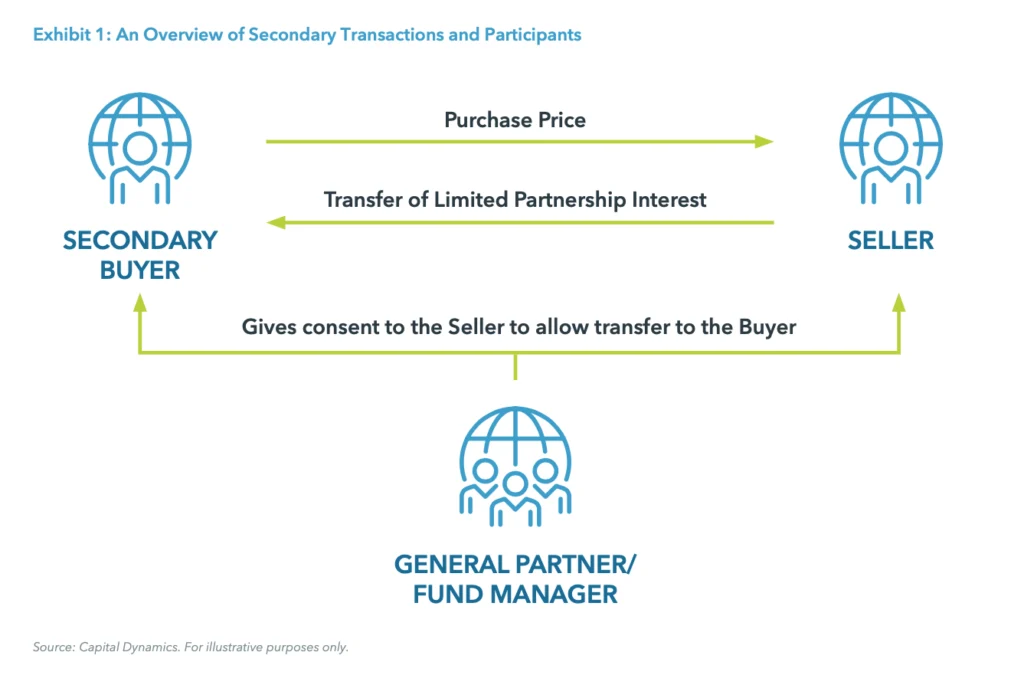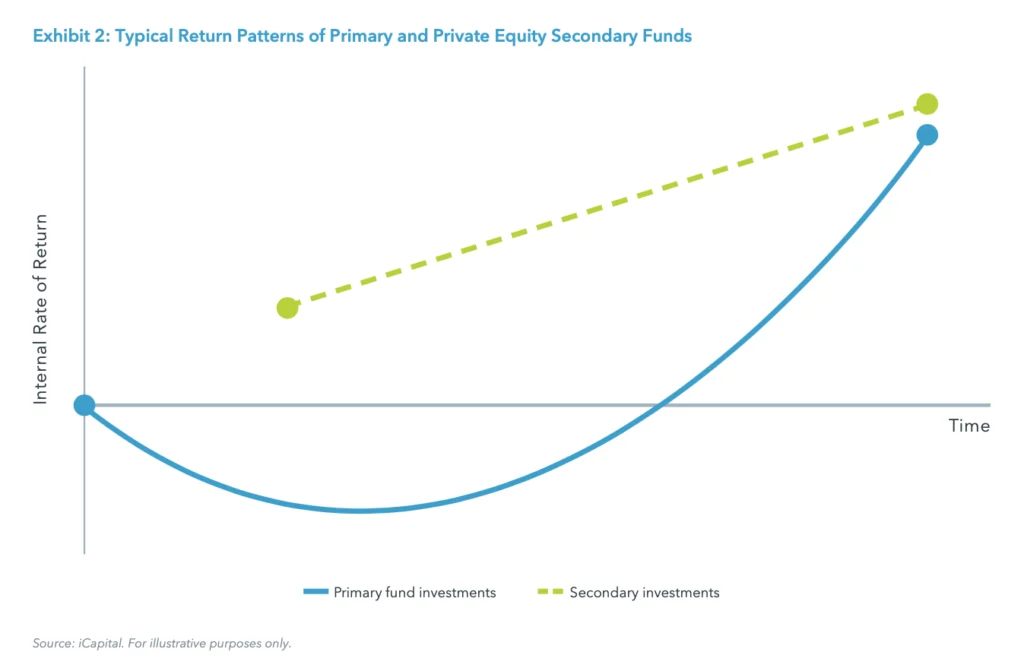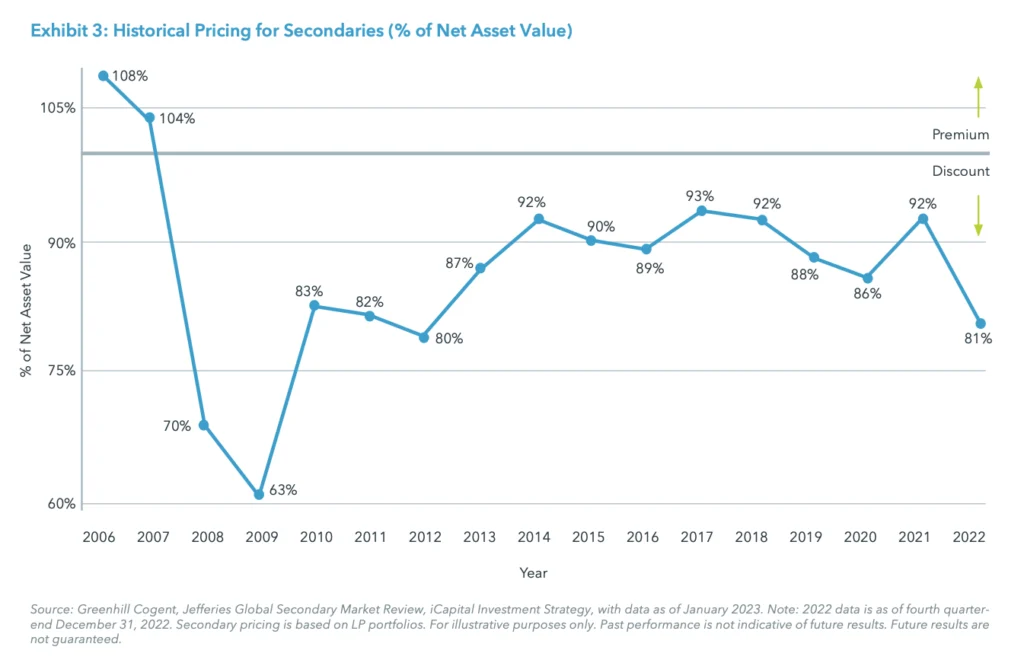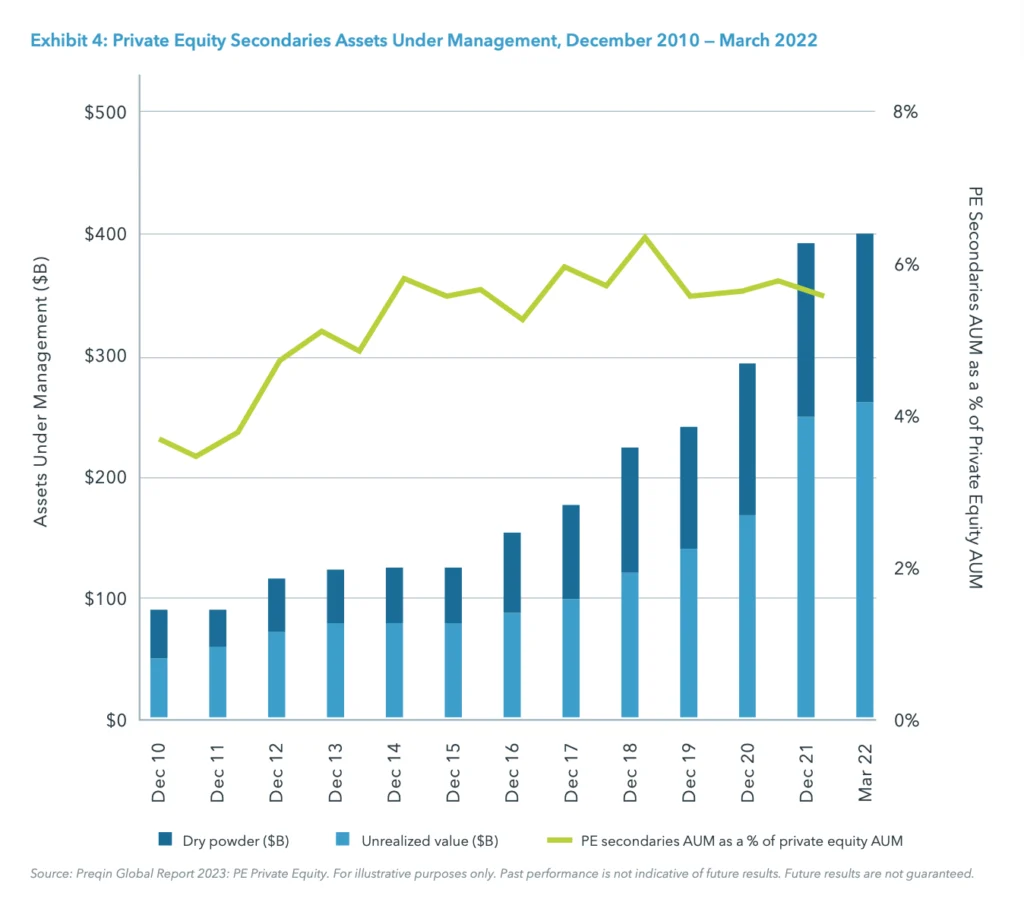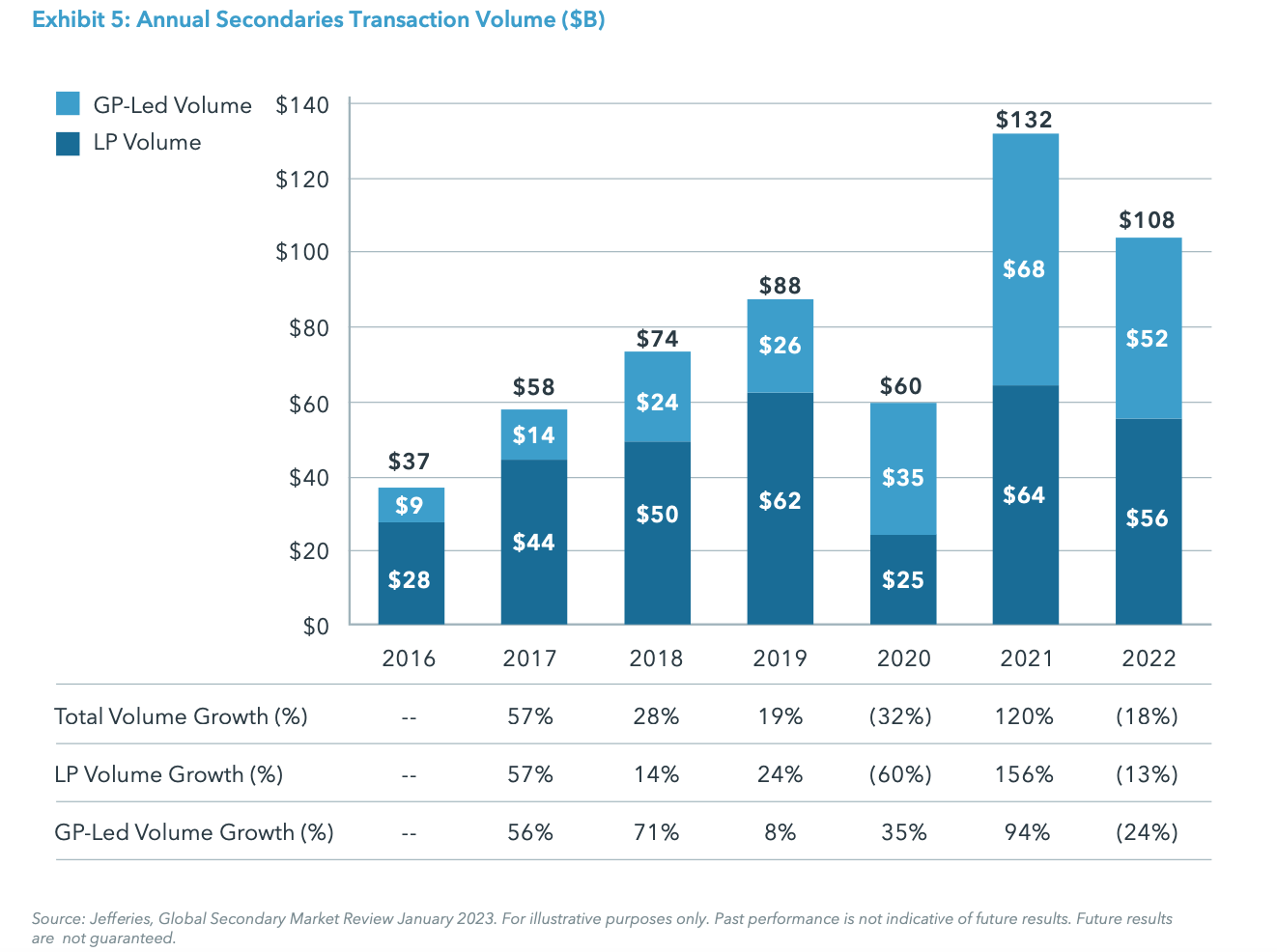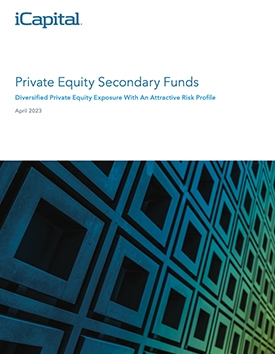Secondary funds (Secondaries) purchase these existing commitments from limited partners (LPs) seeking to exit primary private equity funds before they are fully liquidated. In recent years, the secondaries segment has grown and matured, and may offer significant appeal to investors.
AN ACCESSIBLE ENTRY POINT INTO PRIVATE MARKETS
Private equity secondaries may offer investors a particularly attractive entry point relative to primary private equity funds because of their unique risk and return profile.
Diversification
Secondaries are generally more diversified than primary private equity funds (such as growth equity or buyout funds) because they assume pre-existing commitments in multiple funds. As such, secondaries may offer significant diversification across managers, industries, geographies, strategies, and vintage years. This diversified approach has the benefit of offering private equity exposure with less risk compared to an investment in a single primary private equity fund.
Shorter duration and faster return of capital (mitigated J-curve):
Primary private equity funds typically take three to five years to deploy capital, which means it can take several years before investors start receiving distributions. In contrast, secondary strategies deploy capital faster and distributions typically begin quickly — in some cases as soon as the fund’s inception — because the investment is in mature underlying funds. This mitigates the private equity J-curve, in which primary private equity funds typically have negative returns in the first few years — as investors have to pay management fees and other investment costs from the outset — and only generate positive returns as the underlying investments mature. It is at this juncture that funds typically start to generate returns that may materially outweigh the accompanying fees and expenses. Exhibit 2 illustrates the typical return profile of a primary private equity fund versus a secondary fund.
Discounted access to private equity funds
The ability to exit private equity funds early has historically come at a price to sellers as secondary fund managers would buy pre-existing interests in funds at a discount to their net asset value (NAV).
As illustrated in Exhibit 3, LP portfolios have traded at a discount to NAV since 2007, with more attractive pricing during periods of economic slowdown.1 In addition, economic volatility in the public equities arena can also provide investors with a compelling entry point. This is partially driven by the denominator effect, as public pension funds find themselves overallocated to alternative investments due to the decline in value of their public market positions. As institutional investors reduce private equity exposure, new investors have the ability to benefit from this by participating in secondaries and purchasing these positions at discounts.
Limited blind pool risk
Investors in primary funds don’t know in advance what investments the fund manager will make. This is known as blind pool risk. Secondaries mitigate this risk by investing in existing commitments. In other words, they know which assets they are acquiring before they invest, enhancing the potential for due diligence and providing visibility into potential future performance.
AN EVOLVING AND INCREASINGLY SOPHISTICATED MARKET
Secondary investments initially emerged as a simple mechanism for providing liquidity to constrained LPs. This was a niche market characterized by few buyers, stressed sellers, and steeply discounted prices. As the market has matured, however, it has seen an increase in the sophistication and diversity of its participants.
Accessing the secondary market is often less about gaining liquidity and more about a strategic realignment of an institution’s portfolio. Secondary transactions can help investors reduce the number of general partner (GP) relationships, meet regulatory changes that require a reduction in private market exposure, and address shifting allocation mandates.
The secondary market has also seen an increase in sophisticated entrants, including pension funds, sovereign wealth funds, family offices, endowments, and foundations.
The market’s intermediary channel has also expanded significantly. Secondary advisory firms are now available to help price portfolios, identify buyers and sellers, structure transactions, manage data rooms and non-disclosure agreements (NDAs), and collect and negotiate offers.
Additionally, GPs are increasingly turning to secondaries to provide liquidity for their existing LPs. This allows investors to liquidate their positions in older vintage funds and allows GPs to bring in investors with a different time horizon or those holding an asset that exceeds a fund’s term but where additional time and new capital may allow the GP to create additional value. Such GP-led deals are becoming an increasingly important part of the secondary market. In 2022, they accounted for $52 billion (48%) of the total secondary transaction volume, up from $26 billion (30%) in 2019.2
FUELED BY PRIVATE EQUITY’S EXPANSION
Rapid growth in the primary private equity market has increased the total volume of assets available to be resold as secondaries. This has fueled growth of the secondary market: Since 2010, private equity secondaries assets under management has quadrupled, reaching nearly $400 billion at the end of the first quarter of 2022.3
Moreover, secondary market transaction volume reached approximately $108 billion in 2022, the second biggest year on record, even with the 18% decline from 2021’s record volume of $132 billion.4
CHALLENGES AND OPPORTUNITIES
Pricing levels in the secondary market typically adjust downward during periods of market volatility, leading to a more attractive buying opportunity for secondary fund managers. Downturn-driven reset will instead see the secondary market readjust to lower valuation levels, enabling secondary fund managers to purchase positions at greater discounts. In any market environment, managers who have success in identifying assets outside competitive auctions or in proprietary situations — or where they benefit from an information advantage — are likely to outperform.
Another element for investors to consider is that, while secondaries can provide a mitigated J-curve and a faster return of capital, the cash flow profile of secondary funds is reliant on distributions. Therefore, it is important to select experienced managers who are keenly focused on downside protection and have a proven track record of navigating market cycles.
For investors, the private equity secondary market offers several unique portfolio benefits, specifically for those seeking to gain private equity exposure but are concerned about the duration or significant gap between making a commitment and receiving distributions. As with any private equity investment, manager selection is critical to realize the benefits of these strategies.
ENDNOTES
1. Greenhill Cogent, Jefferies Global Secondary Market Review, iCapital Investment Strategy, with data as of January 2023. Note: 2022 data is as of fourth quarter-end December 31, 2022. Secondary pricing is based on LP portfolios.
2. Jefferies, Global Secondary Market Review January 2023.
3. Preqin Global Report 2023: PE Private Equity.
4. Jefferies, Global Secondary Market Review January 2023.
IMPORTANT INFORMATION
The material herein has been provided to you for informational purposes only by Institutional Capital Network, Inc. (“iCapital Network”) or one of its affiliates (iCapital Network together with its affiliates, “iCapital”). This material is the property of iCapital and may not be shared without the written permission of iCapital. No part of this material may be reproduced in any form, or referred to in any other publication, without express written permission of iCapital.
This material is provided for informational purposes only and is not intended as, and may not be relied on in any manner as, legal, tax or investment advice, a recommendation, or as an offer or solicitation to buy or sell any security, financial product or instrument, or otherwise to participate in any particular trading strategy. This material does not intend to address the financial objectives, situation, or specific needs of any individual investor. You should consult your personal accounting, tax and legal advisors to understand the implications of any investment specific to your personal financial situation.
ALTERNATIVE INVESTMENTS ARE CONSIDERED COMPLEX PRODUCTS AND MAY NOT BE SUITABLE FOR ALL INVESTORS. Prospective investors should be aware that an investment in an alternative investment is speculative and involves a high degree of risk. Alternative Investments often engage in leveraging and other speculative investment practices that may increase the risk of investment loss; can be highly illiquid; may not be required to provide periodic pricing or valuation information to investors; may involve complex tax structures and delays in distributing important tax information; are not subject to the same regulatory requirements as mutual funds; and often charge high fees. There is no guarantee that an alternative investment will implement its investment strategy and/or achieve its objectives, generate profits, or avoid loss. An investment should only be considered by sophisticated investors who can afford to lose all or a substantial amount of their investment.
iCapital Markets LLC operates a platform that makes available financial products to financial professionals. In operating this platform, iCapital Markets LLC generally earns revenue based on the volume of transactions that take place in these products and would benefit by an increase in sales for these products.
The information contained herein is an opinion only, as of the date indicated, and should not be relied upon as the only important information available. Any prediction, projection or forecast on the economy, stock market, bond market or the economic trends of the markets is not necessarily indicative of the future or likely performance. The information contained herein is subject to change, incomplete, and may include information and/or data obtained from third party sources that iCapital believes, but does not guarantee, to be accurate. iCapital considers this third-party data reliable, but does not represent that it is accurate, complete and/or up to date, and it should not be relied on as such. iCapital makes no representation as to the accuracy or completeness of this material and accepts no liability for losses arising from the use of the material presented. No representation or warranty is made by iCapital as to the reasonableness or completeness of such forward-looking statements or to any other financial information contained herein.
Securities products and services are offered by iCapital Markets, an SEC-registered broker-dealer, member FINRA and SIPC, and an affiliate of iCapital, Inc. and Institutional Capital Network, Inc. These registrations and memberships in no way imply that the SEC, FINRA, or SIPC have endorsed any of the entities, products, or services discussed herein. Annuities and insurance services are provided by iCapital Annuities and Insurance Services LLC, an affiliate of iCapital, Inc. “iCapital” and “iCapital Network” are registered trademarks of Institutional Capital Network, Inc. Additional information is available upon request.
©2024 Institutional Capital Network, Inc. All Rights Reserved. | 2024.01



